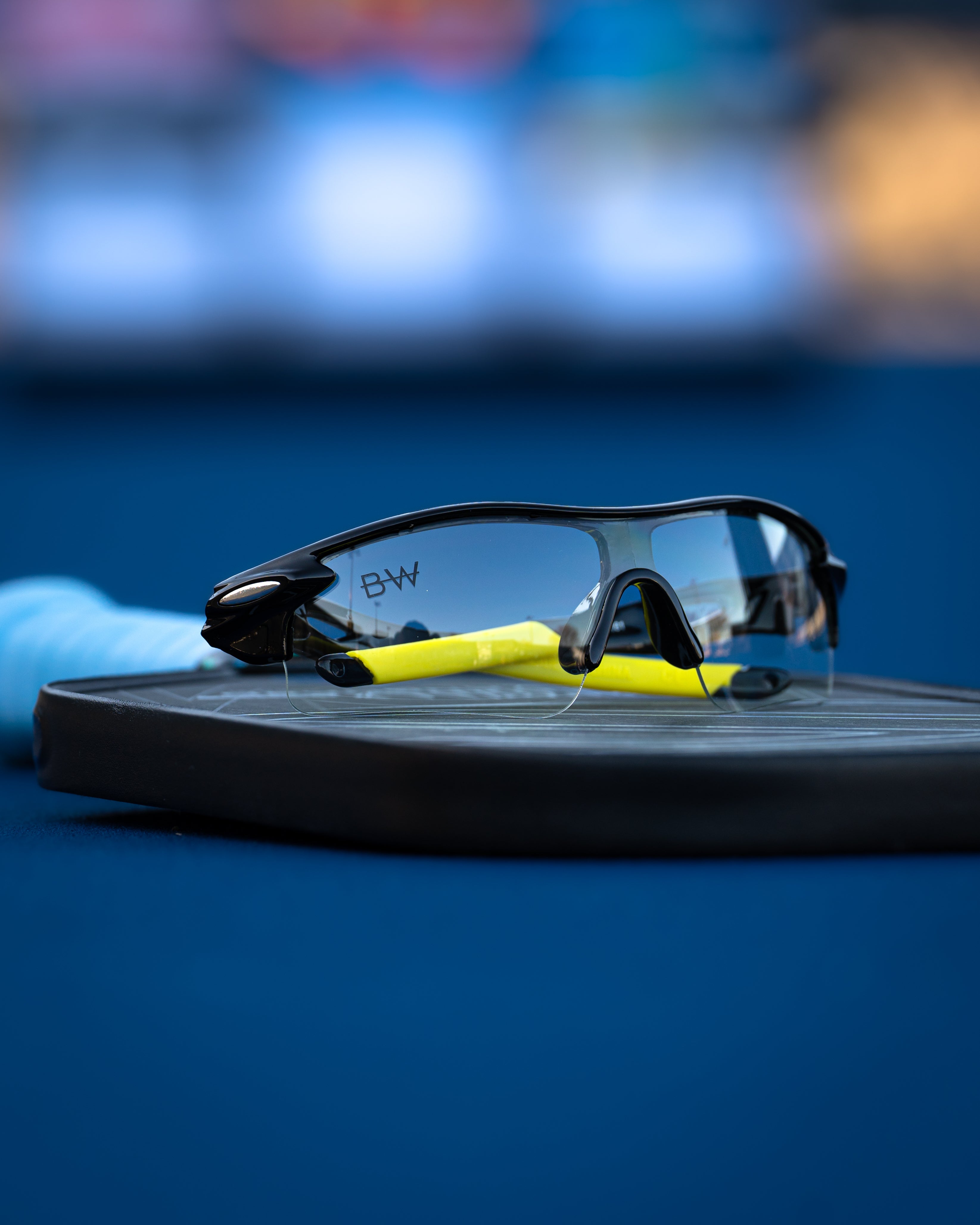Blue Light RX Lenses in Sports: Do They Actually Help?
Share
Blue Light RX Lenses in Sports: Do They Actually Help?
Blue light blocking glasses have made their way from office desks to the court — and athletes are starting to wonder: Do they actually make a difference in sports?
If you wear prescription glasses during pickleball, tennis, or other high-focus games, it’s worth asking whether blue light lenses are just hype — or a hidden edge.
In this article, we’ll cover the real science behind blue light RX lenses, when they help (and don’t), and whether you should consider them for your next pair of Blinded Wear RX sports glasses.
What Are Blue Light RX Lenses?
Blue light prescription lenses are made with a special coating that filters out high-energy visible (HEV) blue wavelengths, particularly in the 400–500 nanometer range. These are most commonly emitted by screens — phones, computers, TVs — but also occur in sunlight.
In sports, blue light filtering lenses may also:
- Reduce glare during bright play
- Limit eye strain over long tournaments
- Improve sleep quality for athletes who play late matches
But the effects vary depending on your conditions.
Related read: How to Test If Blue Light RX Lenses Are Doing Their Job
Do Blue Light Lenses Help in Outdoor Sports?
In direct sunlight: Blue light lenses have only a mild impact outdoors unless paired with grey or transitional tinting. Sunlight includes a wide spectrum of light — and unless the blue-filter is combined with a sunglass tone, it won’t fully reduce brightness or UV intensity.
However, blue light lenses can help with:
- Glare sensitivity: Especially on courts with reflections (e.g., light-colored surfaces, polished gyms)
- Visual fatigue: Particularly for athletes doing back-to-back matches
- Indoor/outdoor transitions: When eyes are adjusting frequently
Best combo: Blue light with clear or transitional RX lenses for mixed light performance.
Try these styles:
- Runway RX — Excellent for indoor/outdoor players needing visual sharpness and focus
- Leathered RX — Ideal for style-forward players wanting a low-glare profile
- Havana Melt RX — Great for high-sweat, variable light environments
Performance Gains: What the Research Says
While research is still growing, early studies show:
- Blue light filters can reduce eye fatigue and perceived strain — especially for athletes who warm up or review footage on digital screens.
- There is no proven increase in sports performance metrics (e.g., reaction time, tracking speed) from blue light filters alone.
- Subjective comfort is often improved, especially in tournaments with late-night matches or indoor lighting glare.
Bottom line: While blue light RX lenses won’t make you faster, they can keep your eyes more relaxed, sharper, and less irritated — which affects performance over time.
Also read: How RX Glasses Train Your Brain to Read the Court Faster
When NOT to Use Blue Light Lenses
There are times when blue light filters aren’t ideal:
- High-contrast sunny play: You’ll benefit more from grey or transitional lenses without the extra blue tint.
- Low-light matches: A blue-blocking tint may reduce visibility slightly in very dim conditions.
- If your focus is maximum true color: Blue filters can slightly shift color tone, especially on white court surfaces.
In these cases, go with Blue Shield RX or Red Shine RX in grey lenses for better sun filtering without tint shift.
What Blinded Wear Offers
Every Blinded Wear RX frame can be built with optional blue light filtering — at no added charge. It’s part of our dedication to lens customization for athletes who demand more than “just glasses.”
All RX lenses include:
- 1.61 high-index material (lightweight, strong, and optically sharp)
- UV protection
- Anti-reflective coating
- Optional blue light filter
We also back every RX pair with our unlimited lifetime warranty — including 50% off if your pair cracks from travel, heat, or court stress.
FAQ: Blue Light RX Glasses for Athletes
Can blue light lenses help with late-night matches?
Yes. They may reduce the eye strain caused by stadium or artificial lights and improve post-match sleep recovery.
Are blue light lenses tinted yellow?
Not ours. Blinded Wear uses clear blue-block coatings that maintain natural color perception without noticeable tint.
Can I combine blue light with grey or transitional lenses?
Absolutely. It pairs especially well with transitional lenses for all-day wear.
So — Should You Use Blue Light RX Lenses in Sports?
If you play in glare-heavy indoor spaces, struggle with eye strain, or want max comfort during digital warmups and night play, blue light RX lenses are worth it.
If your play is mostly midday and outdoors, you’ll benefit more from grey or transitional options — with or without blue light filtering.
Not sure? Start with the RX Lens Match Quiz to get a personalized suggestion in 3 questions.
